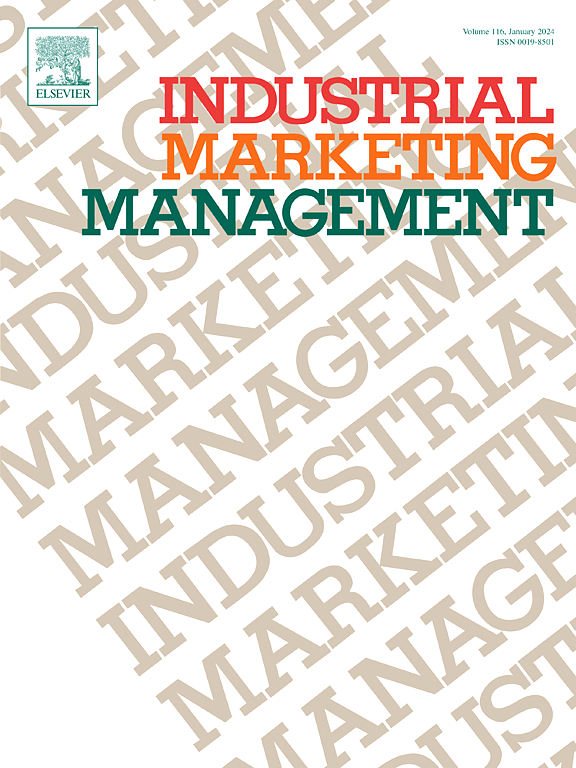B2B digital platform capability and sustainable positioning: Do knowledge depth, knowledge breadth, and agility matter?
IF 7.5
1区 管理学
Q1 BUSINESS
引用次数: 0
Abstract
Given the growing importance of B2B digital platform capabilities for competitive advantage, research on its antecedents and outcomes in the business-to-business context remains scarce. To address this gap, we built on dynamic capability theory to examine how B2B organizations' digital platform capabilities contribute to sustainable positioning. Specifically, we examined the direct and indirect associations (via organizational knowledge depth, breadth, and agility) between digital platform capabilities and sustainable positioning. Additionally, we explored the moderating role of leader boundary-spanning behaviors in the relationship between digital platform capabilities and organizational knowledge depth and breadth. Our study based on two-source survey data from top management in Chinese manufacturing firms. The findings fully support all our proposed hypotheses. Digital platform capabilities significantly enhance sustainable positioning, both directly and through improved organizational knowledge depth, breadth, and agility. Furthermore, leader boundary-spanning behaviors strengthen the impact of digital platform capabilities on both knowledge depth and breadth. These insights offer practical implications for B2B firms seeking to leverage digital platform capabilities to enhance knowledge depth, breadth, agility, and sustainable market positioning.
B2B数字平台能力和可持续定位:知识深度、知识广度和敏捷性重要吗?
鉴于B2B数字平台能力对竞争优势的重要性日益增加,对其在企业对企业背景下的前因后果的研究仍然很少。为了解决这一差距,我们基于动态能力理论来研究B2B组织的数字平台能力如何有助于可持续定位。具体来说,我们考察了数字平台能力和可持续定位之间的直接和间接关联(通过组织知识的深度、广度和敏捷性)。此外,我们还探讨了领导者跨界行为在数字平台能力与组织知识深度和广度关系中的调节作用。我们的研究基于中国制造企业高层管理人员的双源调查数据。这些发现完全支持了我们提出的所有假设。数字平台的能力可以直接或通过提高组织知识的深度、广度和敏捷性来显著增强可持续定位。此外,领导者跨界行为强化了数字平台能力对知识深度和广度的影响。这些见解为寻求利用数字平台能力来提高知识深度、广度、敏捷性和可持续市场定位的B2B公司提供了实际意义。
本文章由计算机程序翻译,如有差异,请以英文原文为准。
求助全文
约1分钟内获得全文
求助全文
来源期刊

Industrial Marketing Management
Multiple-
CiteScore
17.30
自引率
20.40%
发文量
255
期刊介绍:
Industrial Marketing Management delivers theoretical, empirical, and case-based research tailored to the requirements of marketing scholars and practitioners engaged in industrial and business-to-business markets. With an editorial review board comprising prominent international scholars and practitioners, the journal ensures a harmonious blend of theory and practical applications in all articles. Scholars from North America, Europe, Australia/New Zealand, Asia, and various global regions contribute the latest findings to enhance the effectiveness and efficiency of industrial markets. This holistic approach keeps readers informed with the most timely data and contemporary insights essential for informed marketing decisions and strategies in global industrial and business-to-business markets.
 求助内容:
求助内容: 应助结果提醒方式:
应助结果提醒方式:


